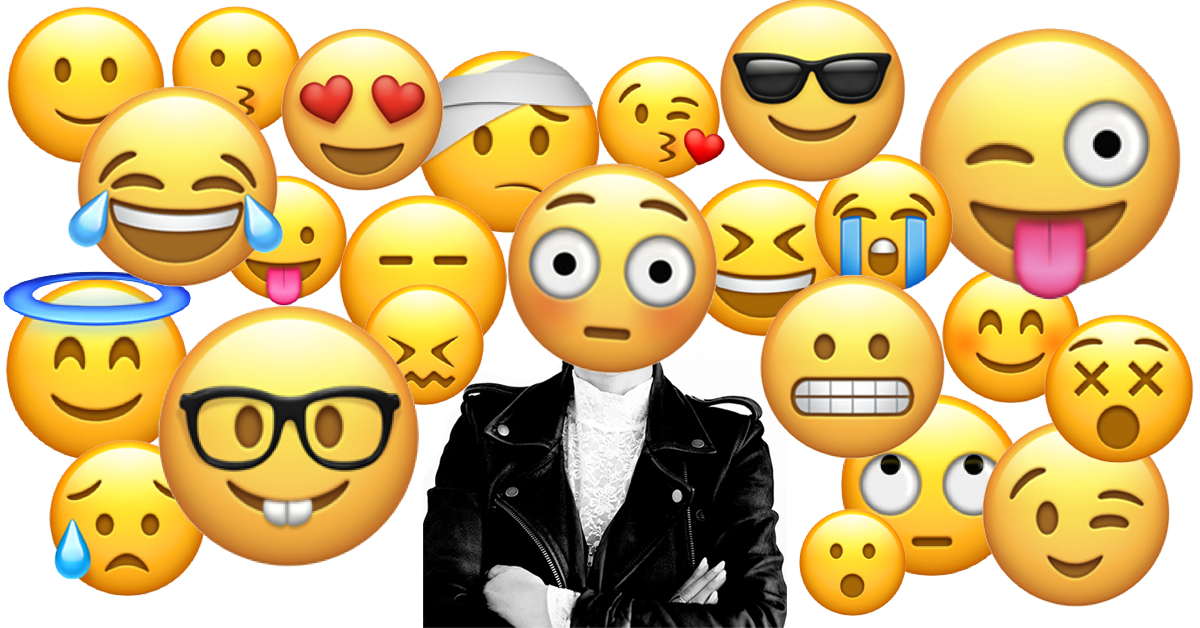News
December 5, 2017Does emojis take the power from the written word?

Today, emojis is in virtually all digital correspondence. They begin to replace our language. So if you walk around and believe it is only kids and lazy adults with a limited vocabulary that use emojis, you are wrong. 90 percent of the world’s online population expresses themselves through emojis. For example, check out Emojitracker, it shows in real time the use of emojis on Twitter.
In the 1950’s, Psychologist Albert Mehrabian concluded that only seven percent of our communication is verbal (what we say), while 38 percent is vocal (how we say it) and 55 percent is non-verbal (what we do, and how we look when we say it).
When we are not communicating face to face, we lack the majority of our communcation tools, and misunderstandings can easily occur.
The feeling that the communication on online platforms is inadequate without facial expressions, gestation and intonation, allows us to include and use emojis.
Then you do not have to wonder if your daughter is ”Good!?” or ”Good!☹”.
And as a curiosity, it may be mentioned that, in reponse to the spread of emojis, humans have developed a new ability in stimulating the part of the brain that is usually activated when we look at a real face. So the use of emojis has led to a new pattern in our brain.
Emoji. The language of totalitarianism?
When iOS10 was released to the iPhone, Apple introduced a new feature that makes it easier to replace a word with an emoji. A service to all of us who love to fill text messages with happy faces, sweethearts and the occasional peach/eggplant. But is it really an attack on our language?
Emojis has evolved from being an innocent tool that complemented our online communication to becoming a substitute for language. If this trend continues and develops, it can lead to the state that the government in ”1984” wished for. Restrictions on expression! If something can not be said, it can not be imagined either. This is the principle behind Newspeak in ”1984”, where rulers are practicing mind control by limiting the language to a minimum.
The same cynicism (hopefully) does not apply to emojis, which was invented by an employee of a Japanese telecommunications company to solve the problem that text messages at that time could only contain a limited number of characters.
As an accessory, the smiley is amazing in all its shades and all of the hundreds of associated emojis. The graphical boost alone of what it can provide to a text message can be addictive. But they also contribute to draining the language from shades.
What would your immediate reaction be, for example, if you recieve a series of red hearts from your colleague? The hearts can have many meanings. Everything from ”thank you” to ”I love you to the end of the world”. The distinction requires words.
The power of words
I acknowledge emojis as the world’s most global form of communication. That it is the fastest growing language ever. And that it has given the dyslexics and uneducated courage and an opportunity to express themselves. And in a world where technology allows everyone to speak up, it gives of course a real ”f*** you” finger to the established classes. One are tempted to look towards the US, where Donald Trump has become the most powerful man using the world’s smallest vocabulary.
Fortunately, I do not suffer from paranoia. And we will probably not experience 1984 any time soon, but emojis is a limited language system. It is governed by a consortium or association named Unicode, whose members include Apple, Google, Facebook, Microsoft and IBM. When the digital giants are involved, one must always be a bit sceptical, but in fact, the problem here is that we are dealing with something that has become very powerful while the way it is controlled and regulated is completely random.
As an example, half a year ago, the gun emoji was suddenly turned into a water gun. When emojis is an important language in rapid dissemination, it is very important to have the ability to regulate the available ”symbol store”. And power and control are of course only possible because emojis as a language is poor and limited compared to the other languages.
I may be a little worried that we will step into a world where we increasingly neglects our own beautiful language and all its subtle nuances, now that we have been awarded a language that gives ut infinite ways to communicate and tell stories.
My advice to anyone working with communication and storytelling is to take a break from using emojis as a wasteful replacement. It is both stimulating and educating.
Timeline
1596
With mirth and laughter let old wrinkles come.
William Shakespeare, The merchant of Venice
1982
Dude! That totally made me laugh.
2001
OMG. That is so funny! LOL!!
2017
Emojis inserts